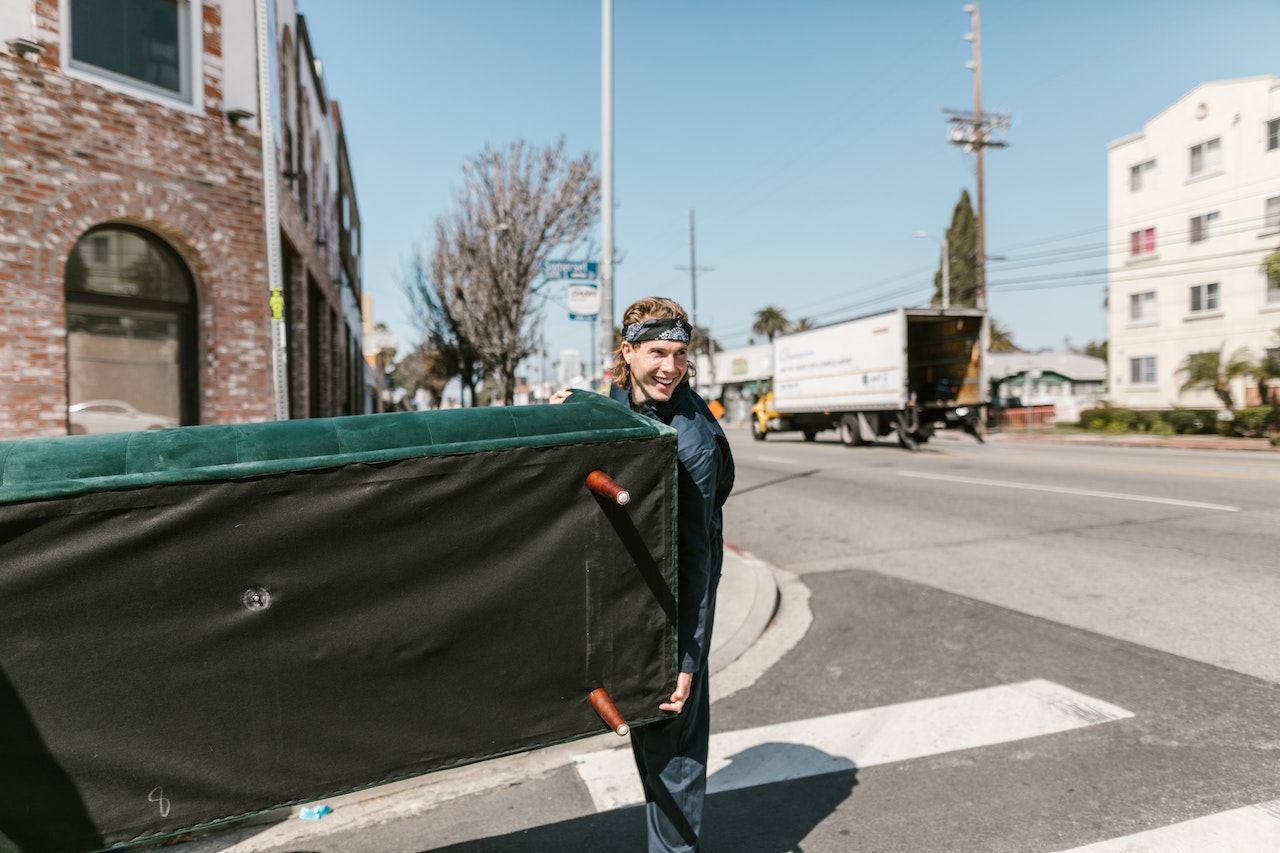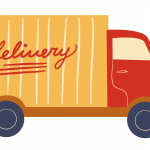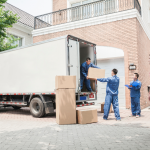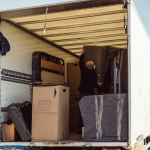Moving to a new home generates a lot of waste – from cardboard boxes to bubble wrap to plastic packaging that ends up in landfills. However, with some planning and creative thinking, you can have an eco-friendly move that reduces your environmental impact.
Here are 12 green moving tips to incorporate sustainability into your relocation.
1. Rent Reusable Plastic Moving Crates
One of the biggest sources of moving waste is cardboard boxes. All those boxes usually get broken down and tossed after just one use.
An eco-friendly alternative is to rent reusable plastic moving bins and crates. Companies like U-Haul offer heavy-duty stackable plastic containers that you can rent, use for your move, and then return to be sanitized and reused over and over.
Plastic storage crates are more durable than cardboard when being loaded in and out of trucks and trailers, reducing the chance of damage to your belongings during transport.
The interlocking lids also provide extra security. And since you return the moving crates after use, you prevent dozens of boxes from ending up in the trash. This simple swap cuts down on waste significantly.
Better yet, if you’d rather not purchase any moving supplies at all, you can let a company like U-Pack handle the move for you!
2. Use Existing Household Items for Packing
Get creative with what you already own around the house to avoid buying new packing materials that will just get tossed later. You can wrap fragile items in clean linens and towels then transport them in bins, baskets, coolers, storage containers or decorative pots you’re moving anyway.
Pack dishes and glasses in clean pillowcases tied shut at the top. Use suitcases, gym bags, purses, laundry baskets, and cardboard drawer organizers to transport clothing and other soft goods.
As long as fragile items are carefully secured in place, you don’t necessarily need bubble wrap and packaging peanuts that will eventually occupy landfill space.
3. Seek Out Secondhand Boxes in Buy Nothing Groups
If you do need some cardboard boxes, check Craigslist, Facebook Marketplace, NextDoor, and neighborhood Buy Nothing groups to find used boxes for free or very cheap. You can also ask friends, family and neighbors if they have leftover boxes from their own recent moves.
Retail stores like grocery and big box stores often give away clean boxes they would otherwise recycle too. Just call ahead to ask when their next shipment comes in and request to take some boxes off their hands. This repurposing is great for the environment.
4. Use Eco-Friendly Packing Materials
If purchasing new packing supplies is necessary for fragile items, look for sustainable materials like:
- Biodegradable peanuts made from corn, potato starch or mushrooms
- Recycled denim pads and recycled paper cushioning
- Plant-based bubble wrap and packing paper
- Natural fiber tape like washi tape
Many green moving supply companies like EcoEnclose sell a wide variety of environmentally-friendly alternatives to help you avoid plastics and non-biodegradable foams that clutter landfills. Properly dispose of these sustainable materials after your move too.
5. Have a Garage Sale and Donate Unwanted Items
Do some pre-move purging so you’re not wasting energy and resources moving things you no longer need. Have an old fashioned garage sale and sell quality used items online via Craigslist, Facebook Marketplace or apps OfferUp and LetGo.
For anything left over that is still in decent shape, donate items to charity thrift stores like Goodwill or Salvation Army. For very lightly used goods, consider a women’s shelter, toys for tots program, or books drive at your local library.
When choosing a charity, check sites like Charity Navigator first to vet organizations according to transparency, efficiency of operations and responsible use of donations. Don’t let things go to waste – donate and give your unneeded possessions a new life.
If you have a lot of junk, we have a solution for that too! Agoyu has partnered with 1-800-GOT-JUNK to save you 5% off a dumpster. Click the button below to save 5% today!
Need Movers? Your Move, Your Choice

Instant Exact Cost for Your Specific Move
Agoyu’s AI technology give you quick, precise estimates. Scan your room, receive instant quotes from multiple movers, and confidently select the best option for you.
STEP 1 OF 3
or Have a Top Mover Call Me Now!
Do it the old fashion way! A top mover will call you to provide an instant quote over the phone or at your house!
6. Recycle Properly After the Move
Once unpacked in your new home, make sure to recycle all reusable move materials like cardboard boxes, paper and plastic bubble wrap. Flatten boxes fully and bundle together. Check with your city website for proper local recycling guidelines.
For non-recyclable but still usable items like furniture pads, mattress bags and plastic bins, consider offering them for free to another future mover via Buy Nothing or other community exchange platforms. This keeps useful moving gear out of landfills.
7. Hire an Eco-Friendly Moving Company
Consider hiring professional movers who implement green policies and practices to reduce the industry’s overall carbon footprint over traditional movers. This includes:
- Using biodiesel vehicles instead of gas guzzling trucks
- Carbon offset programs to mitigate climate impact
- Eco-conscious office policies like paperless billing
- Recycling programs for cardboard, paper and plastics
- Recommendations for customers looking for sustainable moving tips
Having the pros handle the heavy moving logistics means fewer trips back and forth in your own car filled with stuff. So you conserve gas and limit emissions. We can help connect you with the best moving companies in your local area!
8. Limit Driving Back and Forth
To maximize efficiency if shuttling your own items, make as few trips as possible. Having movers handle larger items is ideal. But if tackling any transport yourself, pack your car fully with boxes and items on each trip. Take measurements beforehand and use space efficiently without jeopardizing safety.
Plan driving routes wisely as well. Map out direct paths avoiding unnecessary mileage putting excess wear and tear on your car. Combine essential errands into moving day trips as well. Consolidating trips saves time, gas money and environmental impact through conservation.
9. Leave Out Essentials Until Move-Out Day
When prepacking before the big move, don’t pack away all kitchen, cleaning and bathroom supplies too early. Leave out essentials like paper plates, plastic cutlery, napkins and other items you rely on in the final days leading up to move-out.
Having to rely solely on disposable dishware and towels means extra waste to landfills. Just buy a little extra of what you actually need the final week rather than removing all reusable wares ahead of time.
10. Monitor Your Carbon Footprint
An eco-friendly moving checklist and carbon footprint calculator can help monitor environmental impact throughout the process – from purging to packing to transport. This keeps green moving top of mind instead of just focusing on getting things done efficiently.
You can even offset your carbon footprint through platforms like Terrapass or CoolEffect which let you fund third-party emissions-reducing projects to counterbalance pollution related to your move. Every little bit makes a difference!
11. Clean Green
Use non-toxic cleaners with plant-based ingredients like vinegar, lemon juice, baking soda and Castile soap to prep your old home to hand over and refresh the new place when you arrive.
Avoid chemical-laden cleaning products containing ammonia, bleach, phosphates and formaldehyde that get washed down drains – contaminating waterways which animals and humans eventually consume.
When wiping down dusty services, pick reusable microfiber cloths over tons of disposable paper towels or toxic cleaning wipes. Microfibers clean just as effectively with less waste. Just be sure to launder periodically.
12. Donate Unused Food
Part of green moving prep typically involves cleaning out the kitchen pantry and refrigerated staples that won’t get used up before move-out day. Rather than tossing out still-good items, donate unexpired, sealed foods to community food banks and pantries feeding those in need.
Canned goods, granola bars, crackers, dried pasta and more all get gratefully accepted. Local churches, shelters, schools, Meals on Wheels programs rely on donations too. Just call ahead to ask about specifics on what they do and don’t take. This prevents waste while caring for others.
Moving sustainably requires a little more effort upfront, but pays off with environmental and financial rewards long-term. Following these eco-friendly moving tips will help you leave less of an ecological footprint with each relocation. Soon green moving practices will become second nature!






